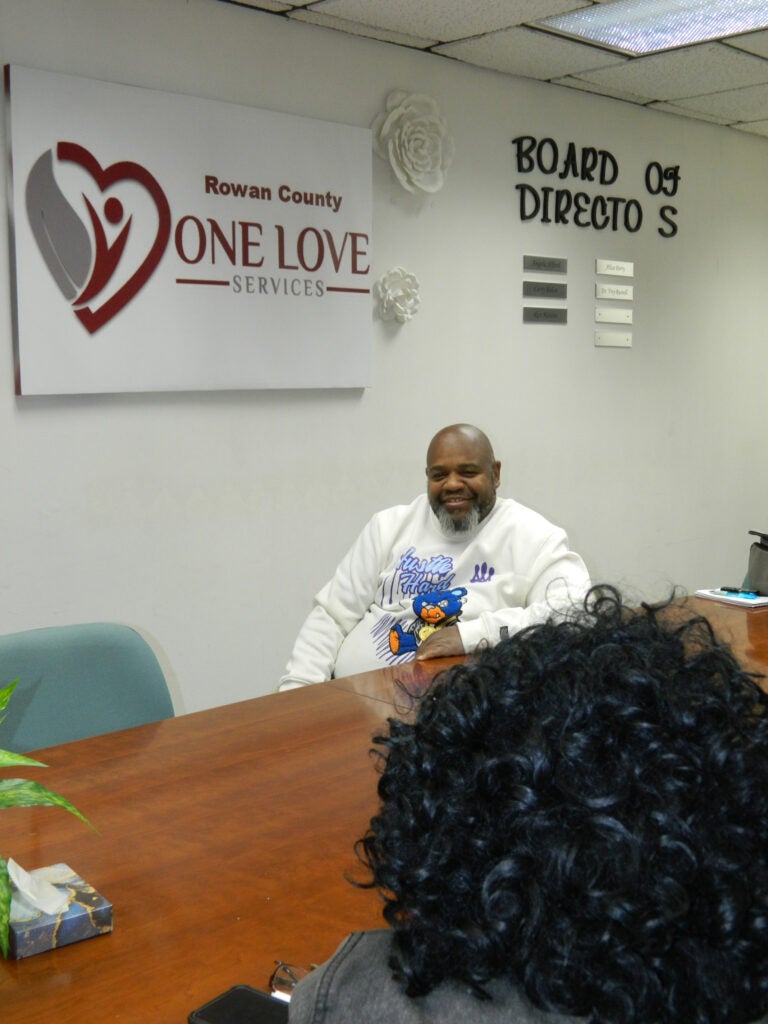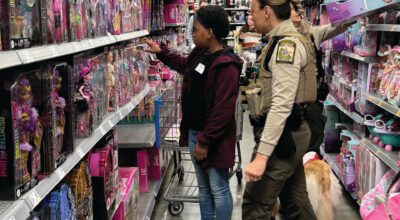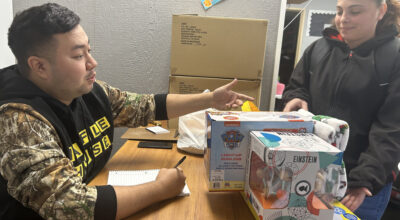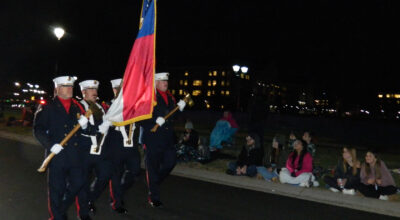It is a blessing: Rowan County One Love Services offers Intensive In-Home program
Published 12:05 am Thursday, February 29, 2024

- Stevie Wideman talks with a parent at the Rowan County One Love Services office. - Karen Kistler
Having a heart for those who need help drives Stevie Wideman to do what he does for the community.
Providing counseling assistance through Rowan County One Love Services, a nonprofit organization, Wideman makes sure that those who have no insurance and no means of payment can receive help as they are dealing with mental-health and substance-use-disorder issues.
Those two issues rose to the top of the list when the Rowan County Health Department recently conducted a health-needs assessment, noted Jackie Harris, who serves as director of development and marketing for One Love community programs.
Harris shared that she knew Wideman, being his neighbor and best friends with his mom. Knowing that she was going to retire soon, she introduced him to United Way, which was aware of his mental-health and substance-use-disorder businesses, and “that’s how we got started,” she said.
They received a grant from United Way for three years and just renewed it for two additional years, which, along with the funding from other foundations, helps them provide the services they offer. As noted on the website, they are clinical assessments, outpatient therapy, medication management, Intensive In-Home, community support team, residential level II, IVA-2 and veterans.
Rowan County One Love Services began in 2020 at the onset of COVID and was housed first on Council Street with only three people: Wideman, the clinical director, and the case manager.
Quickly outgrowing this space, they moved in 2021 to their current location, a much larger one on West Innes Street, and now has 18 employees, which includes their full and part-time personnel.
People come to them for services both walking in from off the street and as the result of referrals from many agencies and “referrals from someone receiving the services or somebody that needs the services,” Wideman said.
While many referrals come in from these various agencies, they also receive funding from multiple sources, including Rowan County United Way, The Blanche and Julian Robertson Family Foundation, The Margaret C. Woodson Foundation, the city of Salisbury, Salisbury Rowan Community Foundation, Wallace and Graham, Food Lion Foundation and St. Luke’s Foundation, thus enabling them to help those who otherwise could not get the help they need.
“We don’t have to turn anybody away,” Wideman shared. “We can figure out a way to help them, do what we need to help because it’s not a financial thing because we’ve got funding that’s here to back that.”
A 1992 graduate of Livingstone College, Wideman did his student teaching at North Rowan High School, where he noted he was given many “individuals that were behavior-driven, so a lot of individuals I had, were having a lot of issues staying in school, were having behavior issues.”
He shared he had the opportunity to take some training working with individuals with disabilities and was recruited to work for a mental-health clinic in Stanly County, which he took over, working there for seven years.
Deciding he wanted to do something on his own, he started providing help in a residential facility setting, starting a group home in 1999, and after several years with the state wanting group homes to be shut down, he opened a nonprofit.
At that time, because people didn’t have the funds to pay and no insurance, they had to be turned away, and he began searching for ways to provide that help regardless of their financial situation.
“If they were willing to come and say ‘I need help,’ then I wanted to be able to provide that help and by partnering up with United Way and then bringing Jackie (Harris)” with her grant writing and fundraising experience and finding ways to raise money,” they were therefore able to help anyone coming and seeking it.
“The grants that I write go for the kids and adults who have no means to pay, and no one ever receives a bill either,” Harris noted.
One of the newest programs that One Love Services provides is its Intensive In-Home, which began January 2023, offering a team approach to help children and youth aged 3-21 who are at risk and need intervention.
It is a six or nine-month program with an evaluation done after 60 days “to see how they’re doing,” noted Wideman. “And you get a reauthorization, meaning if they’re doing well in the amount of time, you get to see them” because you’re trying to train yourself out of it and teach the family.
“That’s the whole concept, being able to train the family to actually do what you’re doing.”
After six months, the program is evaluated to see how the child and parents are doing. Some are fine, he said and can enter outpatient therapy, while others “haven’t gotten there yet,” and they need that additional three months, are re-evaluated after that, and are usually good at that point.
However, he added, “If they’re not doing well enough, and we don’t see that there’s going to be any help, then they will be placed out of home.”
The whole family has to be involved, Harris said. “That’s the key. It’s not just the child or the juvenile or whoever; it’s the whole family.”
To be a part of the program, Wideman noted that certain criteria must be met before being referred to the therapist, who does the assessment.
The criteria include having had at least one prior service, which means they had to be receiving something like outpatient therapy or some type of treatment; they must have received some actual mental health diagnosis; and third, they must have had issues in some other domain outside of just the home, such as issues in the community or school or some other place.
Wideman shared that a plan can be established once the assessment is completed. Part of that plan would be to form a team of three individuals, with two of those being qualified professionals, meaning they have gone to school and have a bachelor’s degree in human services and a year’s experience in the field.
The team is also diverse, being both male and female, depending on the needs of the individual. For example, he noted that if there is no dad in the home, he tries to place two males on this particular team.
But they are all diverse; as Wideman noted, “I always want to put a male and a female on the team. I never try to have all males or all females because that’s not life. You don’t deal with just females or just males. So to be able to understand how to deal with both, we make sure that we do that.”
And Wideman is a part of every team, Harris added, getting to know each child and parent. Therefore, if one of the members cannot be there for some reason, he is not a stranger, thus providing consistency to the team.
The initial meeting, which can either be at home or in the office, is done as a team where all can meet; however, afterward, “they’re scheduled out certain days to show up, and we can see them the first 60 days, we see them four times a week for two-hour increments.”
Those involved in the meetings could be anyone in the family who feels there is a need, he continued, as it could be parents, siblings, grandparents and others who might need more of the service than the recognized individual.
“They are part of the program,” Wideman shared. “We determine where the need is, what does this kid need to be able to be successful,” and goals are set for them, which must be met.
Subsequent meetings can take on different forms, including therapy with the individual named for the program or family members, or the individual could be taken out of the home for some work on coping skills or relaxation time visiting the Y or the library or, if they’re good, Harris added, to high school or college ball games.
Visits to the school and maybe having lunch with the students are also part of the program. If there are issues with schoolwork, tutoring is provided.
Wideman said referrals for this program come from various agencies, including the Department of Juvenile Justice, Health Department, DSS, counseling agencies that provide outpatient services, and the school system, with most coming from the schools.
There are currently 19 participating in the Intensive In-Home program with seven pending, Wideman said, which means “we are going through the process now, getting them into the service,” which takes approximately a week and a half, “depending on the willingness of the guardian,” he continued.
If transportation is an issue with the parent being able to come to the office to do an intake, which must be done before the assessment process, transportation can be provided.
“Transportation is a real problem for a lot of people,” Harris noted, as she said this can be arranged for all their clients.
Even though he is not in the actual brick-and-mortar classroom where his educational path started, that has not stopped Wideman from being a teacher, as he is teaching these young people every day. One of the parents of a child in the program shared that he and all of the team members teach responsibility and are role models to them; they advocate for the youth wherever needed.
If another situation arises in the youth’s life after they are successfully released from the program, they can return for therapy once again, he said. There are no limits as to how much help they can receive.
Wideman added that when the youth is released “from Intensive In-Home, they can return for therapy. That way, we are not just cold-turkeying them all at once.”
One parent shared that this Intensive In-Home program has “really been a blessing, providing emotional support, having someone to talk to, having an outlet.”
During the holidays, special events were offered for the youth, including lots of candy during Halloween, a big dinner at Thanksgiving, and a party at Christmas with a meal and presents. The parents were invited to this celebration as well.
The program, she noted, offers counseling, resources and mentoring opportunities as her child was taken to ballgames and the Y and the library, plus taught some work responsibilities as he learned about catering and was provided tutoring.
When the youth was suspended from school, Wideman answered the call for help as his mom needed childcare right then so she could get to work. He was given chores to complete, plus tutoring to help him catch up with school assignments and complete homework.
“It’s role modeling, redirecting, letting him see there’s another way, but it’s also helping me as it’s giving me a break sometimes, and that’s good. Sometimes, as a parent, you need a break, and it can be challenging. It’s been good for me and it’s been good for him.”
Harris said that Wideman is concerned about these kids and really cares about them and will call and check up on them and see how they are doing.
There are no boundaries as to who might need help.
“It is not just one side of the town; they are from all over the county,” Harris said.
For others who might need this program, one parent shared that she would tell them, “It’s a great program, especially for the kids. They give you a lot of support; they mentor the kids.”
The office, which is located at 723 W. Innes St., is open from 9 a.m. to 5 p.m. Monday through Friday if people drop in seeking help, but those needing help after those hours can call 704-640-5501.
Treatment can take place seven days a week, Wideman shared, as some therapists come in on weekends depending on when the help is needed, or the therapists can do it as some have to work around other jobs they have.
The diversity and consistency of the teams and just knowing that someone has their back and cares for them are all key factors of this program that both Wideman and Harris emphasized.
When it comes to providing help, Wideman will not turn anyone away. If more help is needed, he said he would hire more people.
“He is not going to turn anyone down. If they really need help, he’s not going to turn anyone down,” shared Harris, which means a lot to people.
“They know they’ve got somewhere they can go,” Wideman said. “If we work with a kid and after we’re done, if he is able to maintain and continue being at home, I feel like that is a success.”




